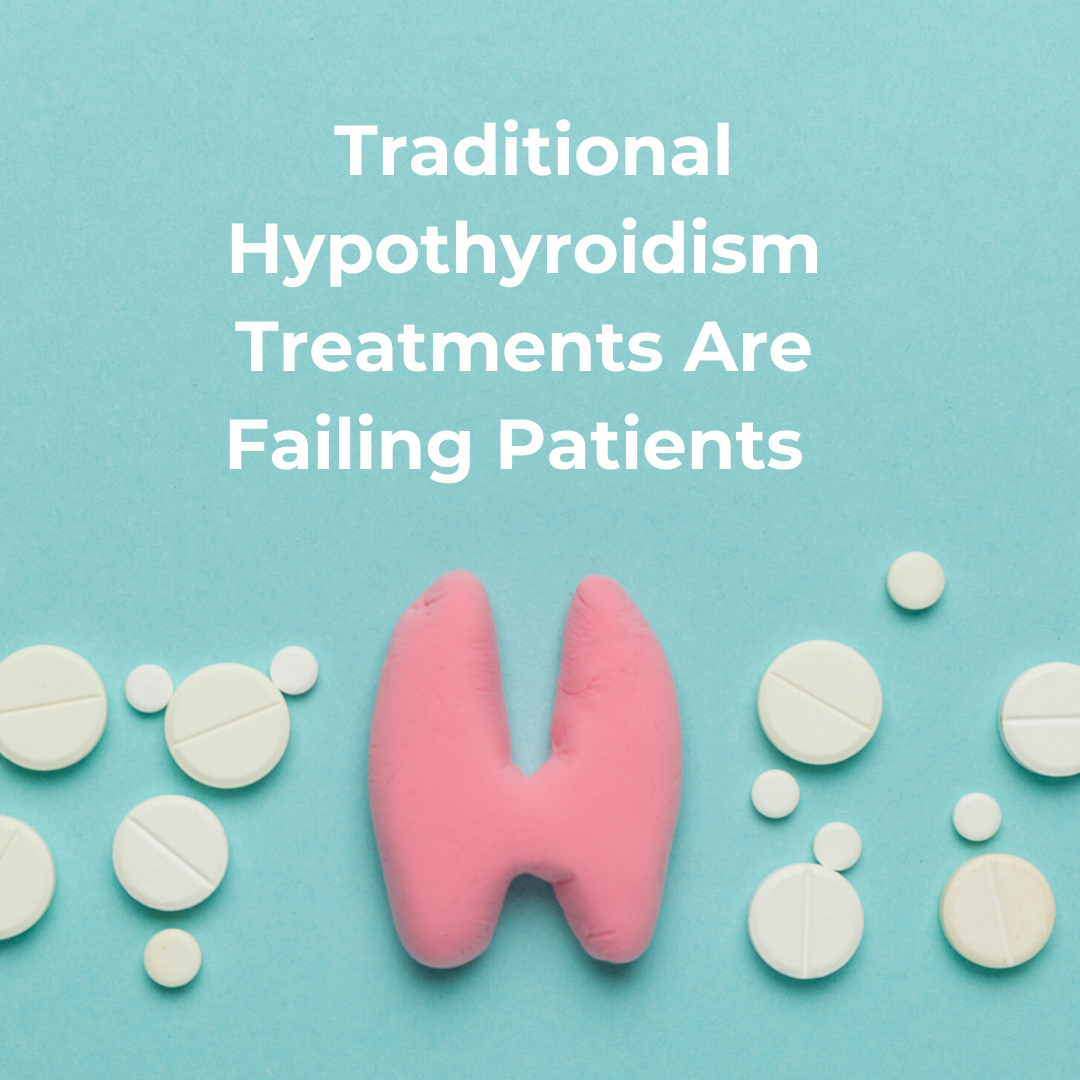Why Traditional Hypothyroidism Treatments are Failing Patients
Hypothyroid patients continue suffering, regardless of being told that treatment is making their TSH better. There are multiple patterns that cause this to happen. Novis Health of Tampa explains.

Hypothyroidism, also known as underactive thyroid, is a medical condition where the thyroid gland does not produce enough hormones (1). It is diagnosed when there are high levels of thyroid-stimulating hormone (TSH), along with other symptoms, including (4):
• Irritability
• Brain fog
• Anxiety and, at times, depression
• Fatigue
• Hair loss
• Weight gain
• Constipation
• Discomfort at cold temperatures
• Irregular menstrual cycle
If left untreated, hypothyroidism can lead to significant health problems, including joint pain, heart disease, infertility, obesity, and other known auto-immune diseases.
Traditional medical treatment for hypothyroidism is a synthetic thyroid hormone known as levothyroxine (brand names Levothroid, Levo-T, Synthroid). This oral medication, taken once daily, improves TSH levels (2). While levothyroxine is relatively effective at restoring normal TSH levels, many patients complain that it does not help with their symptoms, which continue to persist through treatment (3). These include continuing mood changes, not “feeling normal,” and a lack of energy combined with weight changes.3 One study performed by Samuels and colleagues found that quality of life, cognition, and mood were all unaffected by levothyroxine treatment (5).
Primarily though, the quality of life gets worse and worse with time.
With this supporting evidence, researchers are beginning to wonder whether treating hypothyroidism should be modified? Should patients be treated according to their TSH levels, or should the focus be on the actual root cause of the problem? Addressing this question may be the key that finally leads to an improvement in people’s quality of life with hypothyroidism.
What Is Tissue Hypothyroidism?
Tissue hypothyroidism is a condition where the body’s cells and tissues do not receive enough thyroid hormones to function correctly; this can happen even when the thyroid produces normal hormone levels, and people have normal TSH levels (3). It is different from glandular hypothyroidism, which occurs when the thyroid cannot make the hormones. Even when the glandular part is resolved (meaning they have a normal TSH again), the tissue hypothyroidism component persists. Hence, their symptoms never get better no matter what they do.
Conventional levothyroxine treatment is prescribed when TSH levels are low, and it is believed to be effective when these levels return to normal. However, tissue hypothyroidism can make treatment difficult because patients can display hypothyroidism symptoms with normal TSH levels. With this, various studies are investigating what other systems in the body may be contributing to the regulation of TSH and hypothyroidism. The delivery of these advancements is now accessible to those suffering from persistent low thyroid symptoms even though they may be under treatment through an innovative and groundbreaking approach by centers across the country called Novis Health.
What Are Other Factors at Play in Hypothyroidism Patients?
While the leading cause of hypothyroidism is dysfunction of the thyroid, other systems can regulate thyroid hormones.
Inflammatory proteins found in the immune system can play a role in altering levels of TSH in those with non-thyroidal illness (6).
Inherited genetic conditions can make tissues unresponsive to thyroid hormones; patients have normal or elevated TSH levels but experience symptoms of hypothyroidism (7,8).
Many doctors lack the training to support these genetic variants whose impacts can improve with a healthy lifestyle.
Sex hormone levels can regulate the pituitary-thyroid axis (Hormone Master Control Center). Estrogen and Testosterone Therapy can affect thyroid-binding globulin levels, which transports thyroid hormones in the bloodstream, resulting in more symptoms due to changes in sex hormones (9,10).
Metal deficiencies like selenium, zinc, and iron can alter thyroid hormone metabolism (11,12).
Sick euthyroid (normal TSH) syndrome can occur when thyroid hormone levels are low in patients with nonthyroidal illness; this is seen in several conditions/diseases, including heart attack, chronic kidney disease, diabetes, sepsis, and severe trauma (13,14).
Novis Health functional medicine experts help people figure out what factors contribute to hypothyroidism and create a plan to address them effectively.
References
1) Mayo Clinic. Hypothyroidism (underactive thyroid). November 19, 2020.
2) MedlinePlus. Levothyroxine. March 17, 2021.
3) Kalra S, Khandelwal SK. Why are our hyperthyroid patients unhappy? Is tissue hypothyroidism the answer? Indian J Endocrinol Metab. 2011;15(Suppl2): S95-S98.
4) MedlinePlus. TSH (Thyroid-stimulating hormone) test. July 30, 2020.
5) Samuels MH, Kolobova I, Niederhausen M, Janowsky JS, Schuff KG. Effects of Altering Levothyroxine (L-T4) Doses on Quality of Life, Mood, and Cognition in L-T4 Treated Subjects. J Clin Endocrinol Metab. 2018;103(5):1997-2008.
6) Bartalena L, Grasso L, Brogioni S, Martino E. Interleukin 6 effects on the pituitary-thyroid axis in the rat. Eur J Endocrinol. 1994;131(3):302-6.
7) Rivas AM, Lado-Abeal J. Thyroid hormone resistance and its management. Proc (Bayl Univ Med Cent). 2016;29(2):209-211.
8) Moran C, Chatterjee K. Resistance to thyroid hormone due to defective thyroid receptor alpha. Best Pract Res Clin Endocrinol Metab. 2015;29(4):647-657.
9) Bisshop PH, Toorians AW, Endert E, Wiersinga WM, Gooren LJ, Fliers E. The effects of sex-steroid administration on the pituitary-thyroid axis in transsexuals. Eur J Endocrinol. 2006;155(1):11-6.
10) Santin AP, Furlanetto TW. Role of Estrogen in Thyroid Function and Growth Regulation. J Thyroid Res. 2011;2011:875125.
11) Arthur JR, Nicol F, Beckett GJ. Selenium deficiency, thyroid hormone metabolism, and thyroid hormone deiodinases. Am J Clin Nutr. 1993;57(2 Suppl):236S-239S.
12) Dillman E, Gale C, Green W, Johnson DG, Mackler B, Finch C. Hypothermia in iron deficiency due to altered triiodothyronine metabolism. Am J Physiol. 1980;239(5): R377-81.
13) Hershman JM. Euthyroid Sick Syndrome. Merck Manual. September 2020.
14) Williams GR, Franklyn JA, Neuberger JM, MC Sheppard. Thyroid hormone receptor expression in the “sick euthyroid” syndrome. Lancet. 1989;2(8678-8679): 1477-81.

